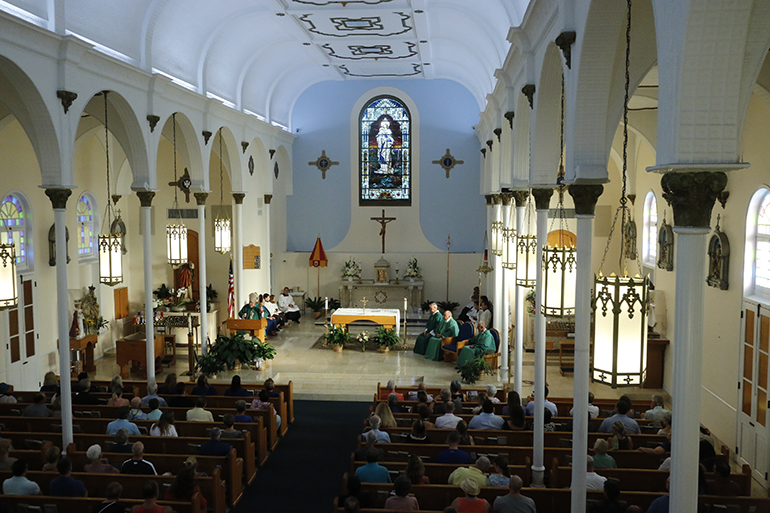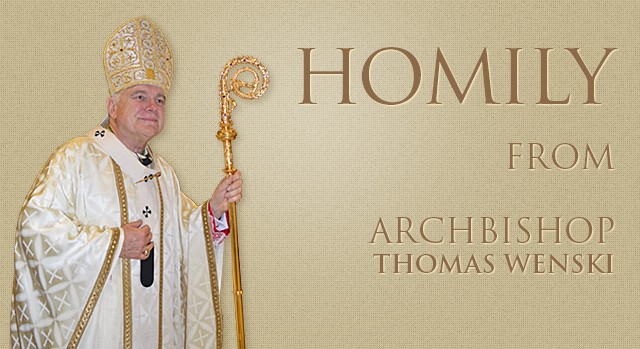By Archbishop Thomas Wenski - The Archdiocese of Miami

Photographer: COURTESY | Sr. Elizabeth Worley
View from the choir loft: Archbishop Thomas Wenski preaches during vigil Mass at the Basilica of St. Mary Star of the Sea Sept. 15. He traveled to Key West to bless and dedicate the new gym built for The Basilica School of St. Mary Star of the Sea.
Archbishop Thomas Wenski preached this homily during the vigil Mass Sept. 15, 2018, at the Basilica of St. Mary Star of the Sea in Key West, where he also blessed a new building, a gym, for The Basilica School.
In today’s Gospel reading, Jesus springs a pop quiz on his disciples. “Disciple” means essentially a student, and students are inevitably given “tests” by their teachers. And so, Jesus asked his disciples: Who do people say that I am? After hearing their replies as to a broad gamut of public opinion about his self, Jesus then asks them: Who do you say that I am? Both questions are important — both for the apostles and for each one of us today. They are defining questions — if we are to understand and to embrace our call to be “missionary disciples.”
Again, to be effective and credible missionaries we must be faithful and committed disciples. We have to know who Jesus is. In asking his apostles, “Who do you say that I am?” Jesus is not looking for an opinion — rather he is looking for an affirmation of firm faith, an affirmation that Peter, speaking for the rest of the apostles, gives.
“Who do you say that I am?” is the basic question whose answer defines our relationship to the Church and to the person of Jesus Christ. To make Peter’s faith our own is what makes us Catholic. “You are the Christ” is the first creed of the Church — the other creeds grow from it — and it is through that creed which gives expression to the faith of Peter and the Apostles we can come to a true knowledge of who Christ is — a true knowledge that is not just knowing something about Jesus but is the knowledge of knowing Jesus. We can come to know Jesus because we believe what Peter believed — namely that Jesus is the Messiah of God.
Certainly, to be disciples we must know the Lord — but if we are also to be missionaries we also must know the people to whom we are sent. And here the other question on Jesus’ quiz is also important: “Who do people say that I am?”
Peter and the apostles answered with an early Palestinian version of an opinion poll. What Peter affirmed of Jesus was born of faith; but the crowds merely opined. The missionary disciple today must be ready to give an answer for the hope that is his or hers — but he or she does so in a world that is often indifferent to faith because it thinks it already knows. But lest we talk past those to whom we announce Jesus Christ, and in order for us to engage the world into which we are sent, we must understand not only what people have to say about Jesus and his Gospel but why they say what they say.
But as we reflect on today's Gospel reading, we might ask why Jesus, after eliciting from the apostles a profession of faith, would tell them not to tell anyone about him. You would have thought that they would be wanting to shout out from the housetops that they had found the Messiah. And of course, one day they would. But it would seem that Jesus first wanted the apostles to understand what his being the Christ meant not on their terms but on his terms. They saw his being the Christ in worldly terms —Jesus will promise them — and us — glory. But heavenly glory, not earthly glory. And the road to heavenly glory, he tells them, passes by the Way of the Cross.
So while Peter got the title right when he recognized Jesus as the Christ, he got the meaning wrong — which is why Jesus told them then “not to tell anyone.”
For the apostles then and for us now, the task of discipleship is accepting God’s terms and not insisting on our own. And here is where the cross comes in. To carry one's cross today often just means to endure some difficulty with patience. But in Jesus' time, carrying one's cross meant accepting a death sentence: to follow Jesus meant that life as you knew it was over.
So, to proclaim Jesus is the Christ of God requires more than just some short-lived enthusiasm. “The Son of Man must suffer greatly and be rejected by the elders, the chief priests, and the scribes, and be killed and on the third day be raised.”
Jesus is telling us that a faith without the cross is no faith at all; at least, it is not a faith that can save. Salvation will come through sacrifice, the sacrifice that awaits Jesus on Calvary. And for our part, self-denial and cross-bearing describes what it means to follow Jesus. Following Jesus — that is, to associate with a Christ who will be rejected — means taking on an identity and a way of living that poses a threat to the world's corrosive ideologies and idolatries.
These ideologies and idolatries create very turbulent waters for the Barque of Peter and those of us who travel on the ship which is the Church. And sometimes it seems that we who are traveling on the ship are trying to scuttle it through our sins of commission and omission as we see today in the very severe crisis in the Church. Yet we should never give in to a spirit of pessimism. For Jesus has given the Church his Holy Spirit. “The gates of hell shall not prevail over her,” Jesus assures us. And so, for almost 2000 years, and here in the Archdiocese of Miami for 60 years, the Church sails on. Thanks to the abiding presence of the Holy Spirit, neither enemies of the Church or the sins of her members have been able to destroy her.
As Pope Benedict once said, “When the world accuses us of our sins, the proper response is not denial but repentance.” Such a repentance is found in our growing in our knowledge of Jesus, in our learning to be faithful, committed disciples. We then can be credible and effective missionaries to a world that needs the good news of Jesus Christ, raised from the dead.
To paraphrase St. John Paul II in speaking of today's youth, people today, whatever their possible ambiguities, still have a profound longing for those genuine values which find their fullness in Christ. “Is not Christ,” John Paul II asks, “the secret of true freedom and profound joy of heart? Is not Christ the supreme friend and the teacher of all genuine friendship? If Christ is presented to young people as he really is, they experience him as an answer that is convincing, and they can accept his message, even when it is demanding and bears the mark of the Cross.”
To be sowers of hope in a world that seems so hopeless, present Christ as he really is — present him on his terms, and not on ours.
For to be a Christian is not a burden but a gift, having encountered him is the best thing that has happened us and to share him with others — as missionary disciples — even at the cost of our very selves, is a joy.

